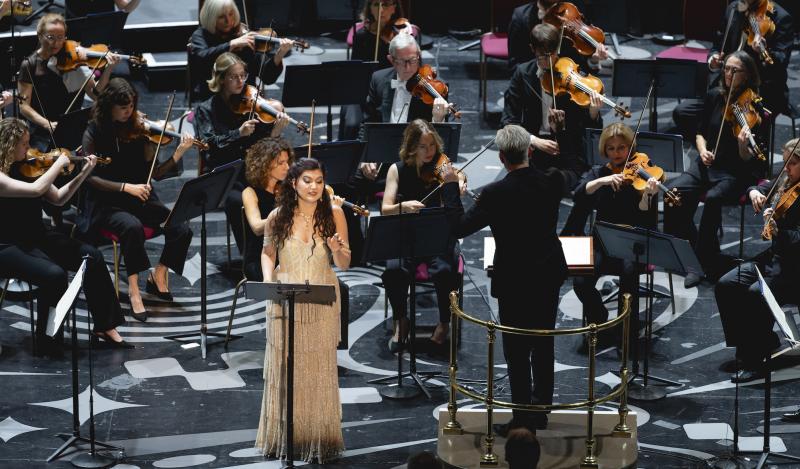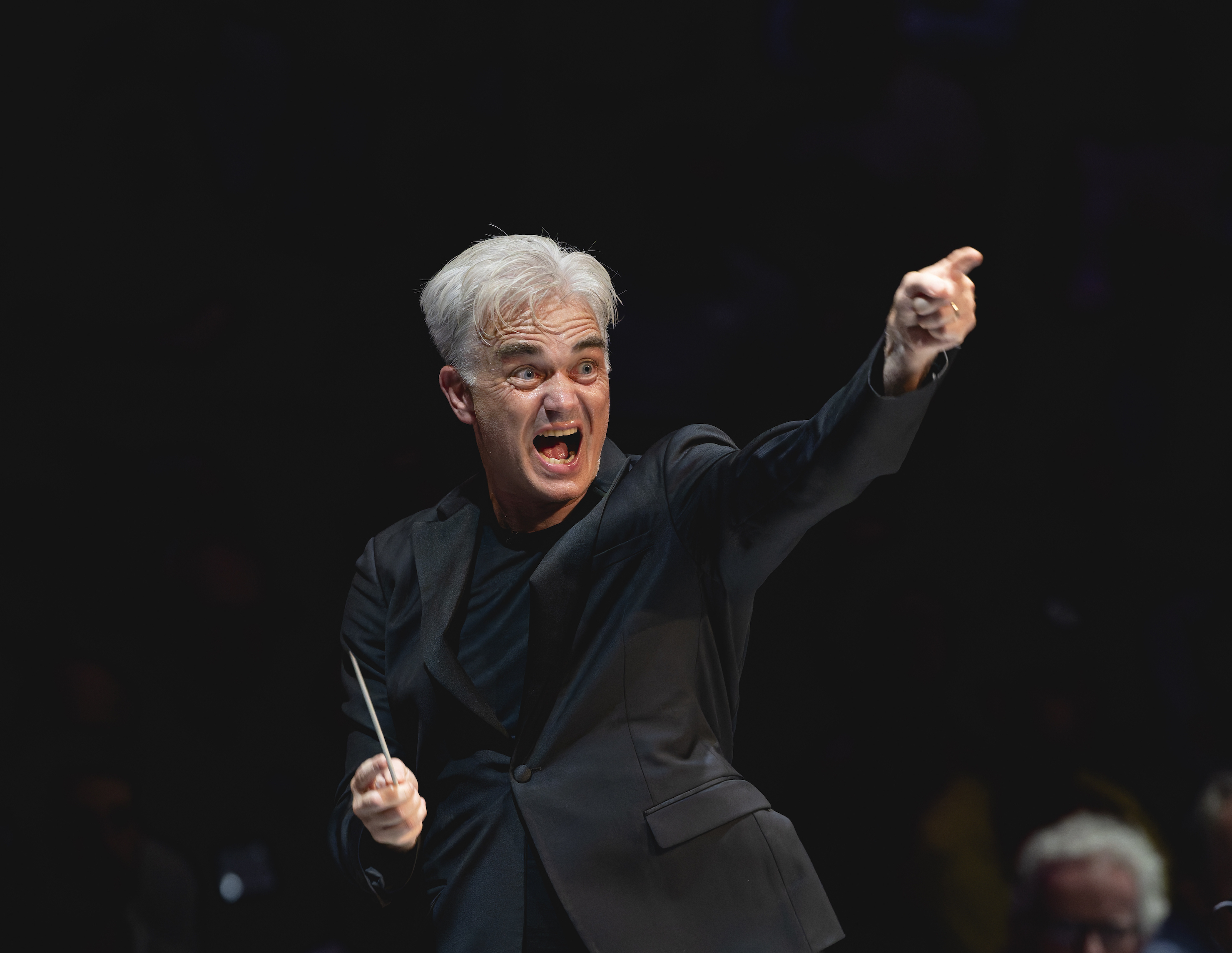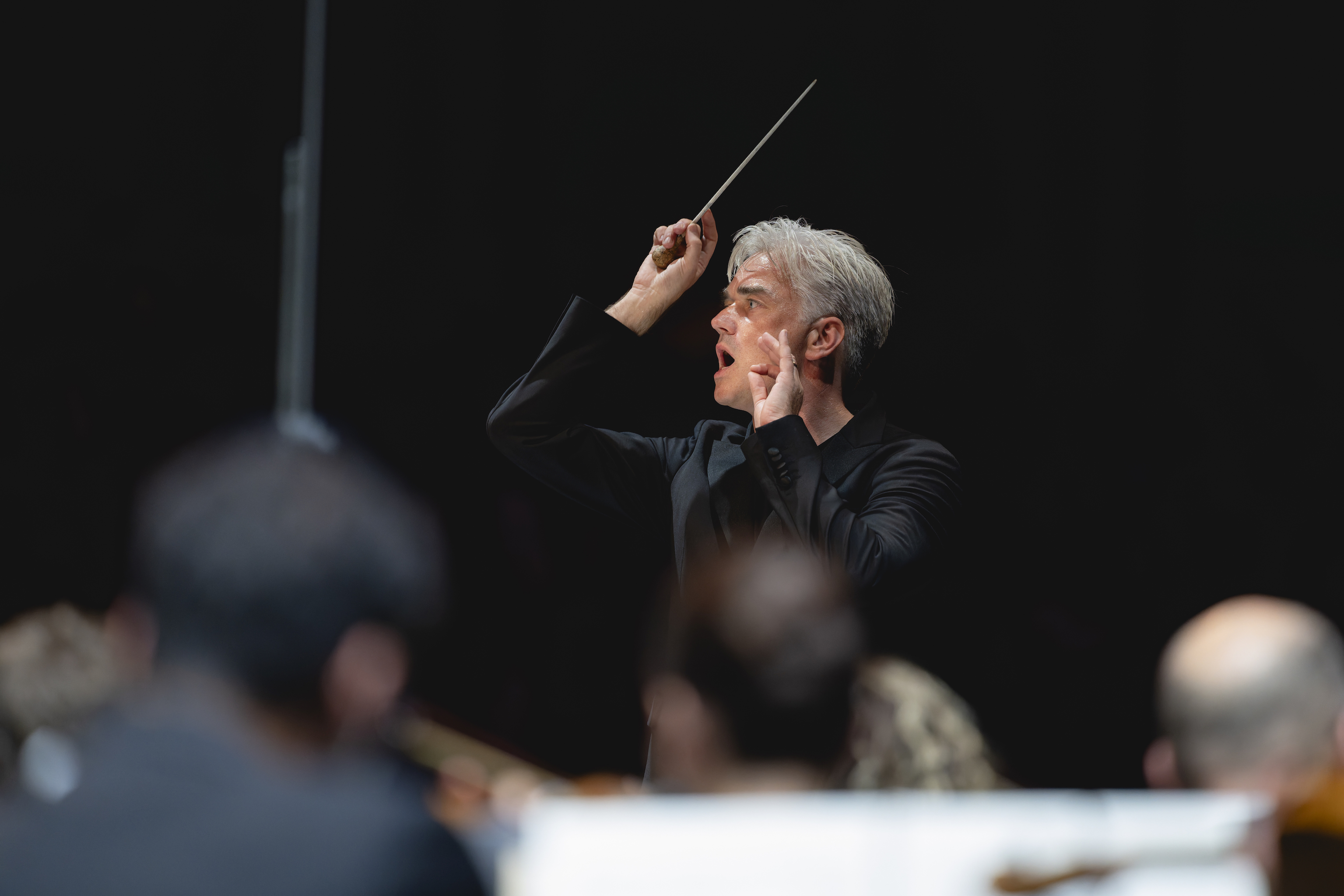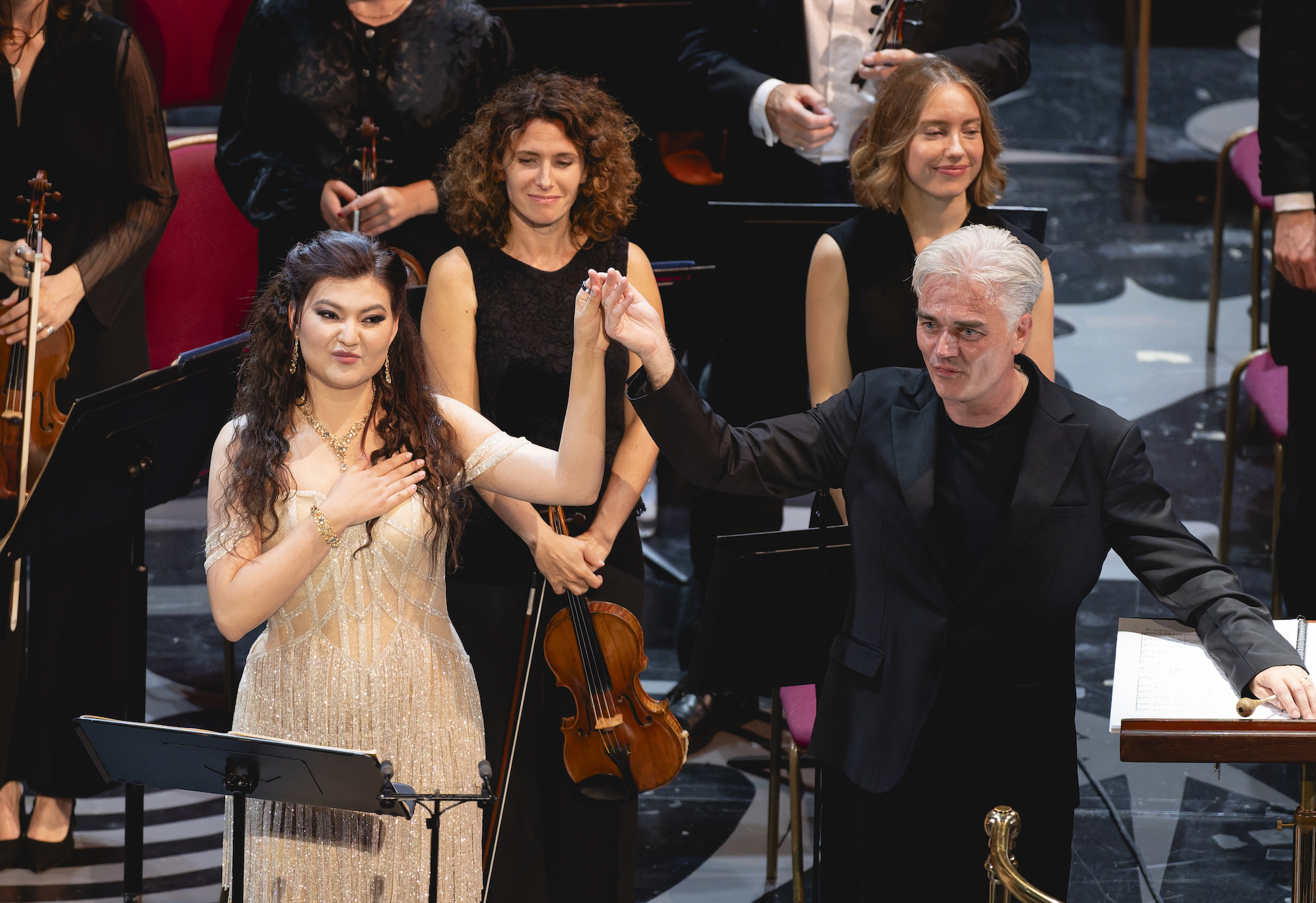BBC Proms: Akhmetshina, LPO, Gardner review - liquid luxuries | reviews, news & interviews
BBC Proms: Akhmetshina, LPO, Gardner review - liquid luxuries
BBC Proms: Akhmetshina, LPO, Gardner review - liquid luxuries
First-class service on an ocean-going programme

Water surged through this Prom from first spray to last drop. But there was nothing damp or diluted about Edward Gardner’s helmsmanship as he steered the London Philharmonic Orchestra through a succession of liquid rhapsodies: three from the early 20th century; one from 1993.
Aigul Akhmetshina, the star mezzo (and ubiquitous Carmen) who sang in Ravel’s Shéhérazade song-cycle, went with the flow herself in a notably collegiate performance that impressively blended her own sumptuous instrument with the lush orchestration around the vocal line.
On paper, this looked like an almost overloaded voyage into luscious colour and texture. Ravel was preceded by Sibelius (The Oceanides) and late Tippett (The Rose Lake), then capped by the marine musical deluge of Debussy’s La Mer. Once they set sail, however, Gardner and the LPO excelled in the light touch on the tiller as much as the heroic heave. We heard plenty of fine filigree detail before, and beyond, the grand splashy tutti.  From the opening flutes and harps that glitter over rocking strings in The Oceanides, it was clear that Gardner (pictured above) would paint his sea-pictures without murk or mist. For all Sibelius’s hypnotic aural effects as the strings surge and ebb, Gardner’s tempi made the ocean passage brisk and bright; we languished in no doldrums here. Waves broke and faded crisply as the LPO brass added their refined weight to the cargo.
From the opening flutes and harps that glitter over rocking strings in The Oceanides, it was clear that Gardner (pictured above) would paint his sea-pictures without murk or mist. For all Sibelius’s hypnotic aural effects as the strings surge and ebb, Gardner’s tempi made the ocean passage brisk and bright; we languished in no doldrums here. Waves broke and faded crisply as the LPO brass added their refined weight to the cargo.
Tippett’s valedictory tone-poem, The Rose Lake draws inspiration from a visit to Lake Retba in Senegal, where in some lights algae turn the waters pink. Dubbed by the composer as “a song without words for orchestra”, it divides its extensive forces – with a mob-handed percussion row – into blocs or groups that do their own thematic thing and only sporadically come together. Five plangent, wordless “Lake Songs” punctuate the orchestral excursions. The LPO delivered this ambitious, centrifugal and (to my ears) sometimes directionless piece with blazing commitment – above all in the percussion ranks. A pair of athletic virtuosi with an array of tuned rototom drums complemented eerily powerful passages from glockenspiel and tubular bells. Indeed, the lake vistas mostly beguiled. Tippett’s autumnal lyricism often ravishes the ear. From perky brass fanfares to plaintive cello themes and soaring woodwind flights, the local colour here can certainly embrace and entrance listeners. But the prevailing atmosphere of elegiac drift, of contemplative immobility, makes this a sometime stagnant inland sea.
A pair of athletic virtuosi with an array of tuned rototom drums complemented eerily powerful passages from glockenspiel and tubular bells. Indeed, the lake vistas mostly beguiled. Tippett’s autumnal lyricism often ravishes the ear. From perky brass fanfares to plaintive cello themes and soaring woodwind flights, the local colour here can certainly embrace and entrance listeners. But the prevailing atmosphere of elegiac drift, of contemplative immobility, makes this a sometime stagnant inland sea.
In contrast, Aigul Akhmetshina knew just where she was going in Shéhérazade. World-ranking diva she may be, but the magnificent mezzo (pictured below with Gardner) never seemed to compete with the LPO’s luxurious backing, or make the voice the foe of the band. The verses she has to sing – glutinous orientalist hokum by the poet Léon Leclère, who called himself with a Wagnerite’s hubris “Tristan Klingsor” – sound sillier than ever, with their paeans to magical “Asia” and overheated fin-de-siècle fantasies of eastern palaces, smiling assassins and androgynous youths. One wonders what a major artist raised in one of Russia’s Turkic regions (Bashkiria) really thought of them.  At any rate, she commanded Ravel’s snaking, sinuous lines with utter assurance, the forceful but never strident delivery, both high and low, nicely balanced (from where I sat) with the orchestral scene-painting that makes rather more sense than the words. In “Asie”, the invitation to an oriental voyage prompted some lovely glides and gurgles in the woods, with the celeste (Clíodna Shanahan), flutes and clarinets turning potential kitsch into authentic magic. Juliette Bausor’s solo entwined immaculately with Akhmetshina in “The Enchanted Flute”, while in “L’Indifférent”, with its Wildean ode to a beautiful youth, the mezzo achieved a chamber-recital intimacy without any sacrifice of vocal power. Across her register, Akhmetshina can grip and hold the hearer without strain, even with Ravel’s full-fat sonic banquet served up all around.
At any rate, she commanded Ravel’s snaking, sinuous lines with utter assurance, the forceful but never strident delivery, both high and low, nicely balanced (from where I sat) with the orchestral scene-painting that makes rather more sense than the words. In “Asie”, the invitation to an oriental voyage prompted some lovely glides and gurgles in the woods, with the celeste (Clíodna Shanahan), flutes and clarinets turning potential kitsch into authentic magic. Juliette Bausor’s solo entwined immaculately with Akhmetshina in “The Enchanted Flute”, while in “L’Indifférent”, with its Wildean ode to a beautiful youth, the mezzo achieved a chamber-recital intimacy without any sacrifice of vocal power. Across her register, Akhmetshina can grip and hold the hearer without strain, even with Ravel’s full-fat sonic banquet served up all around.
As for La Mer, Gardner brought unity, suppleness and a tireless focus on telling detail to Debussy’s great washes and waves of sound. His seascape never aims to soak and drown; each instrumental drip stands out clear, and sparkles. From muted trumpet (Paul Beniston) to shimmering cellos and grainy, growling brass, the ever-changing maritime moods of the first movement – “From dawn to midday at sea” – had their own signature and flavour. Given Gardner’s pinpoint lucidity, Eric Satie’s famous joke about liking the bit at quarter-to-eleven made perfectly good sense.
But we had enveloping, transporting climaxes as well, with Gardner – who generally eschewed big bangs – for once encouraging a mighty marine roar. In the closing “Dialogue of the wind and the sea”, he managed an epic spaciousness that avoided bluster and pomposity. His storm never felt over-rhetorical, and his calm shunned somnolence. Although Akhmetshina executed her solo turn as stylishly as any fan could have wished, Gardner’s captaincy of La Mer proved again that LPO is itself a ship crewed by stars.
rating
Explore topics
Share this article
The future of Arts Journalism
You can stop theartsdesk.com closing!
We urgently need financing to survive. Our fundraising drive has thus far raised £49,000 but we need to reach £100,000 or we will be forced to close. Please contribute here: https://gofund.me/c3f6033d
And if you can forward this information to anyone who might assist, we’d be grateful.

Subscribe to theartsdesk.com
Thank you for continuing to read our work on theartsdesk.com. For unlimited access to every article in its entirety, including our archive of more than 15,000 pieces, we're asking for £5 per month or £40 per year. We feel it's a very good deal, and hope you do too.
To take a subscription now simply click here.
And if you're looking for that extra gift for a friend or family member, why not treat them to a theartsdesk.com gift subscription?
more Classical music
 BBC Proms: Akhmetshina, LPO, Gardner review - liquid luxuries
First-class service on an ocean-going programme
BBC Proms: Akhmetshina, LPO, Gardner review - liquid luxuries
First-class service on an ocean-going programme
 Budapest Festival Orchestra, Iván Fischer, Edinburgh International Festival 2025 review - mania and menuets
The Hungarians bring dance music to Edinburgh, but Fischer’s pastiche falls flat
Budapest Festival Orchestra, Iván Fischer, Edinburgh International Festival 2025 review - mania and menuets
The Hungarians bring dance music to Edinburgh, but Fischer’s pastiche falls flat
 Classical CDs: Hamlet, harps and haiku
Epic romantic symphonies, unaccompanied choral music and a bold string quartet's response to rising sea levels
Classical CDs: Hamlet, harps and haiku
Epic romantic symphonies, unaccompanied choral music and a bold string quartet's response to rising sea levels
 Kolesnikov, Tsoy / Liu, NCPA Orchestra, Chung, Edinburgh International Festival 2025 review - transfigured playing and heavenly desire
Three star pianists work wonders, and an orchestra dazzles, at least on the surface
Kolesnikov, Tsoy / Liu, NCPA Orchestra, Chung, Edinburgh International Festival 2025 review - transfigured playing and heavenly desire
Three star pianists work wonders, and an orchestra dazzles, at least on the surface
 BBC Proms: Láng, Cser, Budapest Festival Orchestra, Iván Fischer review - idiomatic inflections
Bartók’s heart of darkness follows Beethoven’s dancing light
BBC Proms: Láng, Cser, Budapest Festival Orchestra, Iván Fischer review - idiomatic inflections
Bartók’s heart of darkness follows Beethoven’s dancing light
 Weilerstein, NYO2, Payare / Dueñas, Malofeev, Edinburgh International Festival 2025 review - youthful energy and emotional intensity
Big-boned Prokofiev and Shostakovich, cacophonous López, plus intense violin/piano duo
Weilerstein, NYO2, Payare / Dueñas, Malofeev, Edinburgh International Festival 2025 review - youthful energy and emotional intensity
Big-boned Prokofiev and Shostakovich, cacophonous López, plus intense violin/piano duo
 theartsdesk at the Three Choirs Festival - Passion in the Cathedral
Cantatas new and old, slate quarries to Calvary
theartsdesk at the Three Choirs Festival - Passion in the Cathedral
Cantatas new and old, slate quarries to Calvary
 BBC Proms: Estonian Philharmonic Chamber Choir, Kaljuste review - Arvo Pärt 90th birthday tribute
Stillness and contemplation characterise this well sung late-nighter
BBC Proms: Estonian Philharmonic Chamber Choir, Kaljuste review - Arvo Pärt 90th birthday tribute
Stillness and contemplation characterise this well sung late-nighter
 BBC Proms: Kholodenko, BBCNOW, Otaka review - exhilarating Lutosławski, underwhelming Rachmaninov
Polish composers to the fore in veteran conductor’s farewell
BBC Proms: Kholodenko, BBCNOW, Otaka review - exhilarating Lutosławski, underwhelming Rachmaninov
Polish composers to the fore in veteran conductor’s farewell
 theartsdesk at the Pärnu Music Festival 2025 - Arvo Pärt at 90 flanked by lightness and warmth
Paavo Järvi’s Estonian Festival Orchestra still casts its familiar spell
theartsdesk at the Pärnu Music Festival 2025 - Arvo Pärt at 90 flanked by lightness and warmth
Paavo Järvi’s Estonian Festival Orchestra still casts its familiar spell
 BBC Proms: Batsashvili, BBC Scottish Symphony Orchestra, Ryan Wigglesworth review - grief and glory
Subdued Mozart yields to blazing Bruckner
BBC Proms: Batsashvili, BBC Scottish Symphony Orchestra, Ryan Wigglesworth review - grief and glory
Subdued Mozart yields to blazing Bruckner
 Classical CDs: Hens, Hamburg and handmaids
An unsung French conductor boxed up, plus Argentinian string quartets and baroque keyboard music
Classical CDs: Hens, Hamburg and handmaids
An unsung French conductor boxed up, plus Argentinian string quartets and baroque keyboard music

Add comment